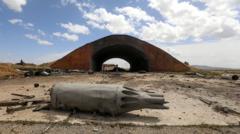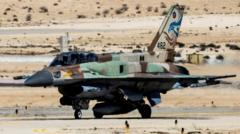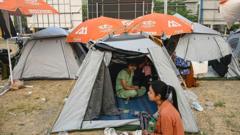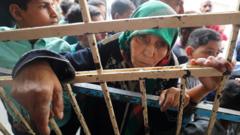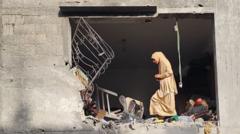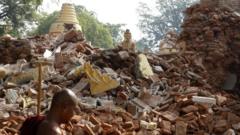The fallout from conflict, combined with the group's diminished military strength and pressures for disarmament, raises serious questions about its future and influence.
**Hezbollah Faces Unprecedented Challenges Amidst Devastating Conflict**
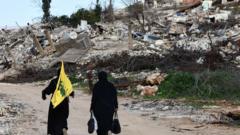
**Hezbollah Faces Unprecedented Challenges Amidst Devastating Conflict**
In the wake of a recent war that has significantly weakened Hezbollah, the group grapples with internal discontent and a shifting political landscape in Lebanon.
Hezbollah finds itself at a pivotal point, burdened by setbacks from a recent war that have fundamentally altered its stance in Lebanon and the broader region. The group's military capabilities were tested severely following a September attack resulting in injuries and fatalities among its members, including the heartbreaking account of a nurse named Adam, who suffered life-altering injuries from an explosive pager designed to signal emergencies.
With Hezbollah classified as a terrorist organization by the UK and US, it maintains political strength in Lebanon, representing a crucial segment of the national political scene. Many within the group’s ranks are not fighters but work within its expansive social services framework, such as hospitals. However, the recent conflict has caused widespread destruction and discontent among its supporters, exacerbating calls for reconstruction while Hezbollah's leadership faces new calls for disarmament from a newly elected government.
Reports indicate that the group's longstanding ally, Iran, is facing challenges of its own, which could result in decreased support for Hezbollah. The war, sparked by Hamas's assault on Israel, ignited a new wave of violence, leading to severe bombings throughout Southern Lebanon and illustrating the precarious balance of power within the region. Compounded by the internal turmoil and the loss of many leaders, concerns are rising regarding Hezbollah's future operational capacity and loyalty from its base.
Visiting the devastated communities in southern Lebanon, it becomes clear there is a complex sentiment among the populace. While some still express unwavering support for Hezbollah, others share remorse, viewing the war as a mistake that could jeopardize their futures. Questions loom over whether Hezbollah can maintain its powerful military presence given the scrutiny it now faces from both local and international players demanding disarmament.
Amidst these challenges, Hezbollah's identity remains intertwined with the lives of its supporters. Yet indications of dissent within the ranks suggest that the group may need to reevaluate its tactics and relationships if it wishes to retain its influence and support amid pressing societal needs. As Lebanon's new leadership aims to reinstate the army as the sole bearer of arms, the group's ability to navigate this transformed political landscape could determine its survival.
Despite the fractures in support and increasing demands for disarmament, many loyalists like Adam continue to uphold the group’s narrative, viewing their sacrifices as a testament to their cause. As Hezbollah charts its course forward, the potential pathways reveal a deep-rooted struggle not only for military dominance but for the very essence of identity and purpose in a shifting Lebanese landscape.
With Hezbollah classified as a terrorist organization by the UK and US, it maintains political strength in Lebanon, representing a crucial segment of the national political scene. Many within the group’s ranks are not fighters but work within its expansive social services framework, such as hospitals. However, the recent conflict has caused widespread destruction and discontent among its supporters, exacerbating calls for reconstruction while Hezbollah's leadership faces new calls for disarmament from a newly elected government.
Reports indicate that the group's longstanding ally, Iran, is facing challenges of its own, which could result in decreased support for Hezbollah. The war, sparked by Hamas's assault on Israel, ignited a new wave of violence, leading to severe bombings throughout Southern Lebanon and illustrating the precarious balance of power within the region. Compounded by the internal turmoil and the loss of many leaders, concerns are rising regarding Hezbollah's future operational capacity and loyalty from its base.
Visiting the devastated communities in southern Lebanon, it becomes clear there is a complex sentiment among the populace. While some still express unwavering support for Hezbollah, others share remorse, viewing the war as a mistake that could jeopardize their futures. Questions loom over whether Hezbollah can maintain its powerful military presence given the scrutiny it now faces from both local and international players demanding disarmament.
Amidst these challenges, Hezbollah's identity remains intertwined with the lives of its supporters. Yet indications of dissent within the ranks suggest that the group may need to reevaluate its tactics and relationships if it wishes to retain its influence and support amid pressing societal needs. As Lebanon's new leadership aims to reinstate the army as the sole bearer of arms, the group's ability to navigate this transformed political landscape could determine its survival.
Despite the fractures in support and increasing demands for disarmament, many loyalists like Adam continue to uphold the group’s narrative, viewing their sacrifices as a testament to their cause. As Hezbollah charts its course forward, the potential pathways reveal a deep-rooted struggle not only for military dominance but for the very essence of identity and purpose in a shifting Lebanese landscape.

